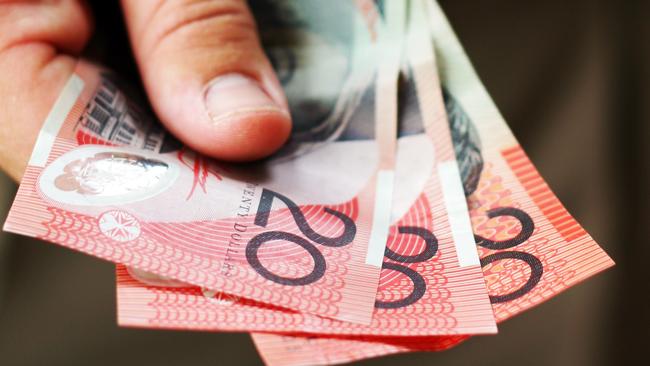‘Consumers are part of the problem’: Plan to punish people who pay in cash and don’t get a receipt
A PLAN to punish customers who pay in cash and forget to get a receipt has been slammed as “completely unfair”.

A PLAN to strip consumers of their legal protections if they pay in cash and fail to get a receipt has been slammed as “completely unfair” by leading advocacy groups.
The proposal was one of 35 recommendations contained in the interim report from the federal government’s Black Economy Taskforce, which argued the need for “consumer-focused action” to crack down on cash payments.
According to Taskforce chair Michael Andrew, former global head of accounting firm KPMG and current chair of the Board of Taxation, while current anti-black economy laws focused on businesses, consumers are “part of the problem”.
“We intend to examine the merits of consumer focused sanctions, including the loss of consumer protections, warranties and legal rights for people who make cash payments without obtaining a valid receipt,” Mr Andrew wrote. “This is not simply of matter of imposing new penalties, but part of a wider cultural change agenda.”
But he argued any new penalty regime “should be carefully calibrated”, with the strongest sanctions “applying to egregious behaviour or repeat offences”. “Lighter touch approaches (including ‘nudge’ techniques) will be more appropriate in many cases,” he wrote.
In a joint submission to the inquiry on Monday, the Consumer Action Law Centre, consumer group Choice and Financial Counselling Australia strongly opposed any such sanctions, warning they could cause “significant consumer harm”, have “serious economic consequences” and would not have any impact on the black economy.
They argued that such a scheme could actually create a perverse incentive for businesses to operate in cash as a way of stripping consumers of their legal rights, describing it as a “significant loophole” that would be “contrary to the intention of legislators”.
“Broadly we support efforts to combat the black economy, because vulnerable or disadvantaged people are often victims, but we think punishing everyday Australians for businesses not complying with their obligations is completely unfair,” said Katherine Temple, senior policy officer at the Consumer Action Law Centre.
In the submission, the group also questioned the effectiveness of the proposal in changing consumer behaviour. “[It] is widely accepted that consumers do not have a good understanding of their consumer rights,” they wrote.
“Consumers can’t make rational payment decisions based on keeping rights that they aren’t aware exist ... [Policy] that is based on the notion that a consumer will make payment decisions based on rational concepts sets an unrealistically high bar which most consumers should not be expected to reach.”
They added that they had been “unable to locate any international precedent or research that suggests this proposal would be effective in tackling the black economy ... both in terms of assisting enforcement agencies, and changing consumer or business behaviour”.
“On the contrary, there is research that indicates measures such as this would reduce tax morality and overall tax compliance,” they wrote, arguing for “consumer incentives” as opposed to sanctions.
Such incentives could include a weekly “receipt lottery”, as introduced by the Portuguese government in 2014, which includes prizes such as free cars and coupons based on the value of the receipts.
“[Consumers] are provided with an incentive to ask for a receipt, as it may also serve as a free-of-charge ticket in VAT lotteries, therefore giving its holder a chance to win attractive prizes,” they wrote.
“This measure aims to get consumers used to asking for fiscal receipts. However, there is insufficient evidence to conclude whether this idea has been effective in combating the black economy.”
The submission also raised concerns with the report’s recommendation for “whole-of-government” use of data to enable “more sophisticated use of analytics (including big data) by government agencies, potentially linking data from welfare, immigration, policy and tax authorities”.
“Our concerns come from the recent Centrelink robodebt scandal, the Census problems, the hacking of MyGov and Medicare records,” said Ms Temple.
“It seems as though we don’t have the capacity to expand our whole-of-government use of data yet, and if we do it without the proper protections and systems in place, there is a real chance people’s data will be misused.”
It comes after Mr Andrew last month floated the idea of using “nano-chips” to keep track of “disappearing” $50 and $100 notes, which could also be subject to “expiry” dates to prevent hoarding of cash under pensioners’ beds and in foreign countries like China.
Estimates for the size of Australia’s so-called black economy vary from $23 billion to $50 billion. The government claims tax avoidance through cash payments costs the budget up to $10 billion in revenue, money that could go towards funding welfare and other services.
In May’s Federal Budget, the ATO received an extra $32 million to fund the Black Economy Taskforce, which hands down its final report in October. The closing date for submissions to the inquiry has been extended to 14 August 2017.




